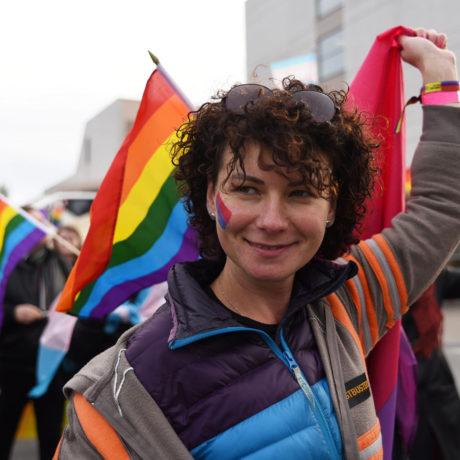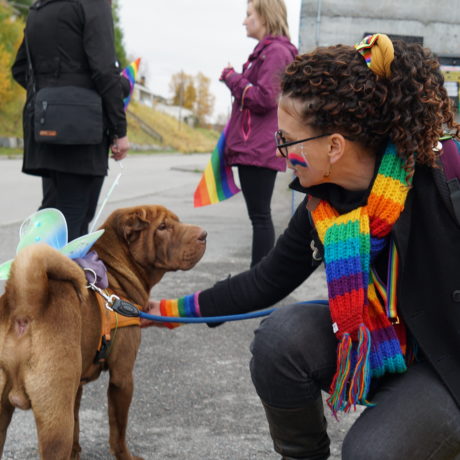
Over the Rainbow
- From March until June 2021, connected to important Human Rights Days, The Norwegian Helsinki Committee will be sharing stories from some of Europe’s brave and energetic human rights defenders.
- Our aim is that young peop le in Norway will learn more about and get engaged in the situation for LGBTI persons in Europe.
- The initiative, “Over the Rainbow”, is carried out in collaboration with the online news portal Framtida.
- Stay tuned for interesting stories, events and even a competition or two!
– In Norway we celebrate our constitutional day on 17 May, and so we often forget this other and significant meaning of this day, says Mina Skouen, who is responsible for Equal Rights in the Norwegian Helsinki Committee.
– On this day I always have my friends and colleagues abroad in mind, as they take to the streets even though it is dangerous, speak out in the media all though they might be sanctioned for it. All of this to fight hatred against LGBTI persons.
One of the brave people fighting homophobia, transphobia and biphobia, is Valentina Likhoshva, from Moscow Community Center for LGBT initiatives, and Equality.Dignity.Pride. We are happy she wanted to share with us what this day means to her and her work.

The largest gap in the world
Valentina is 40 years old. She identifies as bisexual, and prefers the pronouns she, her. Even though she is now living in Moscow, she grew up in Murmansk, not far from the Norwegian border. Norway was always close, not only in a physical sense. And it is a long time since she spent more than a year without crossing the border.
2020 became that year, because of Covid-19.
Many people recognize Valentina’s face from her engagement for the Norwegian-Russian Barents Pride. An event organized every year in Kirkenes, with exhibitions, workshops, film screenings – and a parade.
It was a historical moment when after years of planning, 200 Russians and Norwegians gathered for the first ever Barents Pride in 2017. The location of Kirkenes, just 30 minutes’ drive from the Russian border, represents an enormous symbolic value. The gap between LGBTI rights is perhaps the largest in the world, depending on which side of the border you find yourself.
What started as a solidarity action with Russian LGBTI persons, who could not organize public LGBTI events, quickly became an important event for people on both sides of this symbolic gap.
After the first parade, Valentina was repeatedly asked how she felt.
– I don’t know what I feel because it’s a new kind of feeling. We have never experienced this before, she replied.
– Barents Pride is an example of genuine solidarity, of what acceptance and freedom feels like.
Valentina Likhoshva
– The experience of being yourself together with other people, even if it is just for a few days, was important for all of us who came to Kirkenes. These experiences give us strength, motivation to liv, act and dream.
Valentina was recently given the Thorvald Stoltenberg award 2021, for her work with this initiative, and with justice and equality, human rights and health in the Barents region. The award committee described her as a person who acts when others look away; who speaks up for LGBTI persons, people living with HIV/AIDS, sex workers, refugees, and other groups at risk of stigma and marginalization in Russia.
«Burn!»
This kind of life does not come without risks. When Russian media wrote about her receiving the award, Valentina received death threats. The threats were posted to an article about the award in a Russian social network, and among other things encourage that she should “burn”.
Norwegian human rights organizations called upon the police to carry out an impartial and effective investigation, but the case was dismissed. Valentina was not surprised by this; it is not the first time she has been threatened.
– I work with issues of protecting the right to life, freedom from violence, increasing the visibility of LGBT+, reducing stigma against LGBT+. All this work is carried out in the context of discriminatory laws, and harassment by the police and government agencies.
– The situation is getting worse, and it will worsen even more. If we do not stand together, we will not survive. Without support, I could not have done anything, Valentina says.

Now he is free
The strongest stories of homophobia and transphobia she knows, are the stories of those who come to stay at the LGBT+ shelter in Moscow. One of them is Corey, a young transgender man with autism. Corey was born into an ordinary family.
– Not only did his mother not accept him; she even put him through conversion therapy in a psychiatric clinic. But Corey found the strength to leave his parents’ home. For one and half month, he stayed in the shelter, and during this time he found a job and could live his own live. Now he is free.
Another story is that of Vasily, a transgender boy who escaped from brutal violence at home, without any of his identity documents. His parents reported him to the police so that he was placed on their wanted list, and he had to fight a hard battle to fight this. Instead of receiving help from police officers and social workers, he was met with transphobic attitudes and hate.
– But with the help from a lawyer and psychologist he is ok now. He is a talented artist, and his work has been exhibited at the LGBT+ Open Art Festival.
The European umbrella organization ILGA Europe, measures the human rights situation for LGBTI persons on an annual basis, and for 2020 Russia is considered the fourth worst country of the 49 countries that are measured.
A Russian law that prohibits so-called “propaganda of non-traditional sexual relations towards minors” has forced LGBTI organizations and groups to explicitly state that all information they share is for people above 18 years.
Human rights organizations has repeatedly warned that this law endangers children and youth, as it prevents them from gaining information about their rights, their health and psychological wellbeing, and the European Court of Human Rights has stated that the law violates human rights.
– We miss you
The final weekend of September 2020, when it was time to organize Barents Pride for the fourth time – Norway and Russia were separated by a corona-closed border. And because of this, Barents Pride was different that year compared to what it has been before. But – Barents Pride has always been a different Pride. It has always proven that physical distance and borders do not stop friendships, relations and cooperation.
And maybe because of this, the 2020 event was able to cope with the new and strange situation. On the Norwegian side, people gathered with banners on the border, and during the parade the streets of Kirkenes were filled with people carrying signs with “I walk for Igor”, “I walk for Anastasia”, “We miss you”. On the Russian side, they had a festival indoors, out of safety reasons.
It was not possible to be together physically – but it was still a way of being together.
– When I saw pictures of our friends on the border with posters “we miss you”, I cried because it touched me so much. I realized that we are not alone.
Valentina Likshoshva
– My hope is that we will be able to meet and hold the Barents Pride together in Russia. I dream that we will walk through the city with flags, that everyone who wants to go with us shoulder to shoulder. Perhaps I will be old, but I will definitely live to see this day.
Do you want to know more?
In this film you can get to know Valentinas work better:
The International Day Against Homophobia, Transphobia and Biphobia is celebrated every year and all over the world on May 17. It was established to coordinate international events that raise awareness of LGBTI rights violations and stimulate interest in LGBT rights work worldwide.
That date was chosen to commemorate the decision to remove homosexuality from the International Classification of Diseases of the World Health Organization (WHO) in 1990.
If you want to know more, you can read more about what activists are doing around the world to celebrate the day here. If you want to know more about homophobia, lesbophobia, transphobia and biphobia in Norway, you can check out organizations Foreningen FRI, Queer Youth, PKI, Queer World, and Salam Norge.
For more information, please contact:








